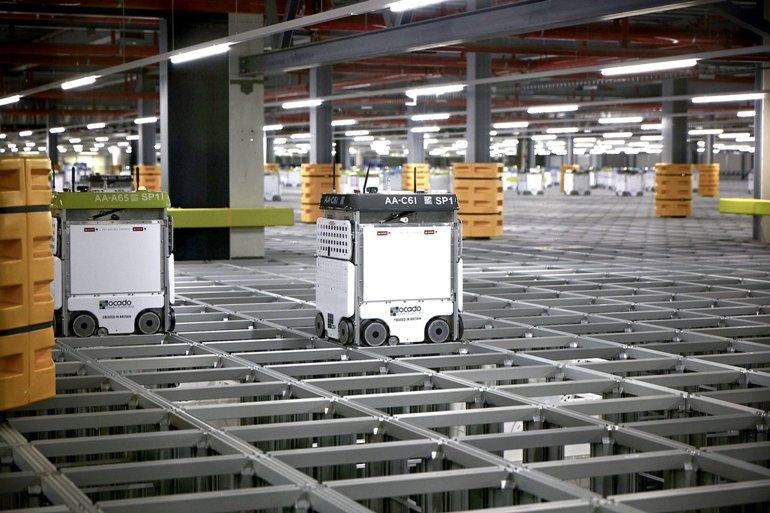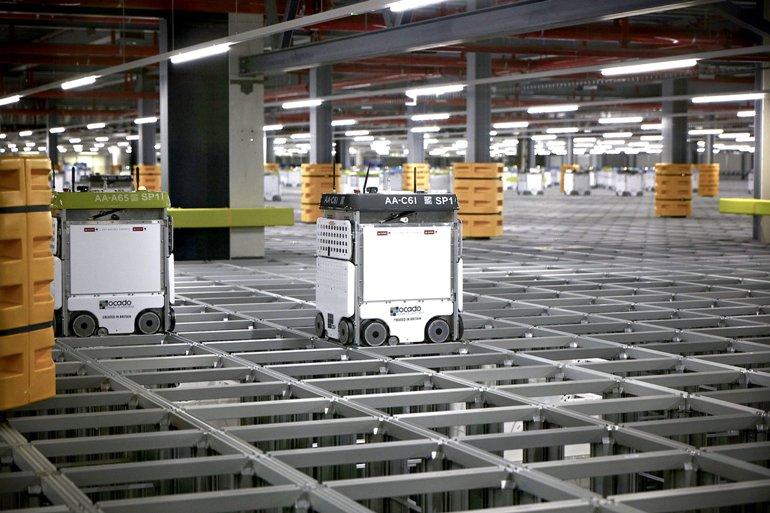

Ocado——Smart retail plus smart supply chain, making retailers a unicorn
Founded 20 years ago with the aim of revolutionizing the online grocery market, Ocado now sees itself as a technology company rather than a retailer.

You'll no longer see Ocado vans laden with groceries on British city streets -- a roving ad for the company's promise of direct-to-door deliveries of apples, oranges, raspberries and other fresh produce.
Founded nearly 20 years ago, Ocado was promoted to the FTSE 100 in 2018, while its market capitalization soared to £6.1bn. Since then, the company has signed no fewer than five international deals with retailers including Marks & Spencer in the UK and Kroger, a large US supermarket chain.
As a result, when Ocado's full-year results were announced in early 2019, chief executive Tim Steiner emphasized that the company was an "18-year overnight success".
There is another key statistic; the same year, the company posted a net loss of nearly £45m. Furthermore, Ocado has only turned a pre-tax profit twice since it was founded in 2000. Ocado sees the nature of its business as different from traditional retail; in fact, the company prefers to describe itself as a "technology company". It invests in innovation.
Alex Harvey, Ocado's general manager of automation and embedded systems, told ZDNet: "Our goal is to change the world of grocery shopping, and early on we focused on being a retail company."
"But we realized early on that adopting technology was about augmenting our offering. That's why technology has always been in Ocado's DNA and why it's now our main business, not retail," he said.
Back in 2000, Goldman Sachs bankers Jonathan Fayman, Jason Gissing and Tim Steiner came up with the concept of Ocado, an "online grocery retailer" that started from large warehouses rather than brick-and-mortar chains. Electronic retailer with home delivery.
When the founders began trading with Waitrose in 2002, they understood that what sounded like an idea was actually a logistical mountain to climb.
In order for customers to use the platform, they must deliver goods quickly, reliably, and attractively. In addition to being complex to work with, groceries are perishable, they require special care, they need to be kept in a variety of different temperature zones, and so on.
So, while Amazon can stuff books into a van without thinking twice, Ocado has to make sure that when customers order a bunch of bananas, they don't get crushed by a milk carton.
To make it work, Ocado's founders needed a new system. Since no one had built a retail e-tailing business before, they decided to develop the technology themselves: a new division, called Ocado Technologies, was born.
The company made an ambitious bet. It decided to build large-scale regional warehouses, which were deemed more efficient, rather than small-scale local facilities.
Being closer to Ocado's customers means faster deliveries, using a model similar to traditional supermarket home deliveries such as Tesco and Sainsbury's.
Instead, the e-retailer has created large "honeycomb" structures where groceries are stored in crates and on which dishwasher-sized robots coordinate their actions to collect and move items.
The robots travel 31 to 37 miles a day, constantly picking and mixing under the control of a central system powered by artificial intelligence. It takes them an average of 5 minutes to pick an order of 50 items and hand the order over to a human worker for packaging.
The warehouse is just one part of what the company calls the Ocado Smart Platform (OSP), which also includes the end-to-end software system for running an online retail business from start to finish, whether it's running an e-commerce site or managing the routes of delivery vans.
OSP is the technology the company now relies on to generate profits, not just deliver groceries. Ocado actually sells the platform to retailers like Marks & Spencer or Kroger who want to go live but need a third party to provide them with deliveries.
"We can provide all the back-end technology that we provide," Harvey said. "Now we can be a platform provider for international retailers."
There is no doubt that Ocado's OSP is an innovative concept, GlobalData food and grocery analyst Thomas Brereton told ZDNet.
"Their model is very interesting and it's all about differentiating themselves from other online providers," he said. "They would rather be called a global logistics solution than just a UK supermarket."
Ocado's latest deal with M&S will pour £750m into the business, money that could be further invested in the technology arm rather than the retail arm, the analyst said.
Calling Ocado a mature tech company is a bit of an overstatement, however: Brereton notes that the company's retail business still currently generates more than 10 times the revenue of its technology division.
However, Ocado shares are valued like a Silicon Valley unicorn, not like a supermarket.
Last year, the online retailer was worth four times its revenue; by comparison, Amazon was worth three times its sales and Tesco was worth 0.4 times its revenue.
Ocado's focus on its technological "solutions" has apparently bolstered analysts' confidence that it will deliver on its promises. But the company may have set its expectations too high, especially given its inability to consistently generate profits.
Last month, investment firms JPMorgan and Jefferies raised questions about some aspects of the online retailer's business model. They wrote in a joint report that Ocado's £9 billion valuation at the time was "exorbitant" and revalued the company at a share price of about 40%.
JPMorgan added that the company's previous valuation was based on "potential" new contracts with retailers, or the prospect of signing new warehouses with existing customers.
But to justify Ocado's market price, at least 126 new facilities would need to be built. By comparison, the company's deal with Kroger is for 20 warehouses.
"We do not think the risk/reward is compelling and the scope for outperformance appears to be limited," the report said.
Brereton said that while Ocado's concept was promising, there was some uncertainty about the company's strategy. “They need to start seeing some returns before they move on to the next wave of investments,” he said. “Only losses are sustainable.”
For him, the way forward is to refocus some of his energy on customer service for users of the company's retail business.
Warehouse automation and OSP innovations are impressive feats, but for customers it offers about as much end service as other supermarkets, he said.
"Orders are not being delivered particularly quickly," he said. "From a consumer standpoint, Ocado isn't doing anything spectacular."
In the UK, the e-retailer has 721,000 active customers; accounting for around 14% of the UK online grocery market. Its share of the same market globally fell to 1%.
As such, the analyst believes Ocado should focus on customer relationships before building out "flashy" new technology to increase its market penetration and start generating revenue.
Instead of focusing on retail, though, the company appears to be implementing more innovative technologies. For example, it is involved in a research project called SOMA to improve fruit and vegetable picking by robots.
An Ocado spokesperson explained that the investments are all about increasing warehouse productivity and, ultimately, customer service.
"Providing a sustainable and economical grocery service online is very difficult," the spokesperson said. "We've invested a lot of money in (the business). Of course it's not making money right now, but our shareholders expect us to create value over the long term. It took us a long time to figure out that there are no shortcuts."
For these reasons, the company still sees itself as "a 20-year-old startup." But twenty years is a long time indeed. Maybe now is the time for Ocado to take it to the next level.
Author: Daphne Leprince-Ringuet
This article is from a translation, if you want to reprint, please obtain authorization from this site first.
